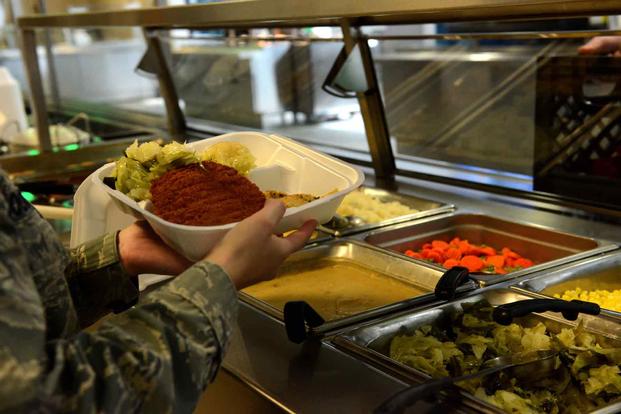Shaw Air Force Base in South Carolina has not had an operating dining hall for airmen in nearly a year and a half, leaving some relatives of young troops concerned about their food accessibility.
The base, located near Sumter, South Carolina, is home to the 20th Fighter Wing and several other Army and Air Force units comprising more than 5,000 active-duty troops and their families. The installation’s Emerson E. Williams Dining Facility, the on-base dining facility, or DFAC, has been closed since May 2023 and its Afterburner Grill has been closed since July, according to the base.
Those facilities are listed as “closed until further notice” on the base’s website.
Read Next: Status of Navy Crew Still Unknown as Mountainous Terrain Slows Efforts to Reach Growler Wreckage
“There is no other operational DFAC on Shaw Air Force Base as both are closed for remodeling and infrastructure upgrades,” Staff Sgt. Dallin Wrye, a 20th Fighter Wing spokesperson, told Military.com in an emailed statement.
Wrye told Military.com that “both dining options are scheduled to reopen in 2026” and pointed to informal dining options on base such as the Carolina Skies Club, Molly’s Bar and Grill, Rickenbacker’s Coffee Shop, Tee Top Café at the golf course and the Cosmic Grill at the bowling alley, as well as the base exchange, which is home to several fast-food chains.
Additionally, Wrye said that airmen who are living in the dorms started receiving Basic Allowance for Subsistence — a food allowance — at $920.50 a month in the interim.
But one relative of a service member stationed at Shaw Air Force Base said their young airmen hadn’t received that payment yet. Furthermore, the relative also pointed out that some service members don’t have cars, meaning they have to rely on rides to get groceries or meals in town.
Additionally, many of those early career airmen might not know how to cook.
“At what point are your meals nutritious, when you’re buying canned goods or non-perishables?” one relative of an airman stationed at Shaw Air Force Base told Military.com.
Additionally, the relative pointed out that many of the young airmen are overworked, not having time to cook nutritious meals in their shared dorm kitchens, if they even know how to.
“They want everybody to be fit to fight,” the relative added. “But they’re young, barely learning how to cook and make nutritious meals for themselves.”
The criticisms of the lack of dining hall options at Shaw Air Force Base comes amid a Pentagon-wide analysis of the accessibility and healthy offerings at and around military bases.
A report from the Government Accountability Office — Congress’ watchdog agency — published this summer found that many military bases are overpopulated with fast-food locations and that the limited operating hours at many dining hall facilities pushed many troops to seek the drive-thru lane instead.
Even if troops can make it into a DFAC that’s running and operating, the GAO found that many of the healthy initiatives are not followed properly.
Despite those occasional shortfalls, Robert Evans, the founder and developer of “Hots&Cots,” a smartphone app that tracks the quality of meals and dorms at military bases, told Military.com that those dining halls, or DFACs, are sometimes the most reliable and healthy options for young troops.
He added that when those dining halls aren’t accessible, it pushes those service members to often rely on unhealthy options.
“Some of these kids, this is their first time being exposed to living on their own and being able to make choices on their own,” Evans said. “To some degree, you risk them falling back into
kind of like bad habits of going to fast-food restaurants, going to gas stations, going to these kiosks or what have you to get food that’s not necessarily healthy.”
Info about a government contract at Shaw was posted in May, seeking “between $1 million and $5 million,” adding “the DFAC will be completely redone to include new floor and wall finishes, casework, equipment, acoustical ceiling tile and grid, and lighting,” according to the online listing.
Related: Military Dining Halls, Pentagon Failing on Efforts to Offer Nutritious Meals at Bases, Watchdog Says
Story Continues
Read the full article here


